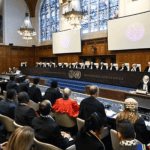The European Court of Human Rights has announced that Ireland has filed a legal challenge against Britain over a new law that grants conditional amnesties to former troops and militants involved in decades of conflict in Northern Ireland.
Victims’ families, human rights organizations, and all major political parties in Ireland, including British unionists and Irish nationalists, have all criticized the statute. It became effective in September of last year.
The Irish government, which filed the complaint on January 17, claims that certain aspects of the statute are incompatible with the European Convention, according to an ECHR statement.
Britain has postponed prosecutions of those engaged in the ‘Troubles’ period, claiming they are unlikely to succeed and that an independent body should be established instead.
Britain claims that trials related to events up to 55 years ago are increasingly unlikely to result in convictions, and that legislation is required to end the conflict.
Meanwhile, when Dublin announced its decision to sue the British government over the bill last month, it stated that it had no choice but to initiate legal action because London had ruled out any political settlement.
According to the report, Britain labeled the Irish government’s challenge “unnecessary.”
Approximately 3,600 people were killed in three decades of conflict between Irish nationalist militants seeking a united Ireland, pro-British ‘loyalist’ paramilitaries, and the British military. A peace treaty signed in 1998 marked a significant end to the violence.
The European Court of Human Rights has announced that Ireland has filed a legal challenge against Britain over a new law that grants conditional amnesties to former troops and militants involved in decades of conflict in Northern Ireland.
Victims’ families, human rights organizations, and all major political parties in Ireland, including British unionists and Irish nationalists, have all criticized the statute. It became effective in September of last year.
The Irish government, which filed the complaint on January 17, claims that certain aspects of the statute are incompatible with the European Convention, according to an ECHR statement.
Britain has postponed prosecutions of those engaged in the ‘Troubles’ period, claiming they are unlikely to succeed and that an independent body should be established instead.
Britain claims that trials related to events up to 55 years ago are increasingly unlikely to result in convictions, and that legislation is required to end the conflict.
Meanwhile, when Dublin announced its decision to sue the British government over the bill last month, it stated that it had no choice but to initiate legal action because London had ruled out any political settlement.
According to the report, Britain labeled the Irish government’s challenge “unnecessary.”
Approximately 3,600 people were killed in three decades of conflict between Irish nationalist militants seeking a united Ireland, pro-British ‘loyalist’ paramilitaries, and the British military. A peace treaty signed in 1998 marked a significant end to the violence.
The European Court of Human Rights has announced that Ireland has filed a legal challenge against Britain over a new law that grants conditional amnesties to former troops and militants involved in decades of conflict in Northern Ireland.
Victims’ families, human rights organizations, and all major political parties in Ireland, including British unionists and Irish nationalists, have all criticized the statute. It became effective in September of last year.
The Irish government, which filed the complaint on January 17, claims that certain aspects of the statute are incompatible with the European Convention, according to an ECHR statement.
Britain has postponed prosecutions of those engaged in the ‘Troubles’ period, claiming they are unlikely to succeed and that an independent body should be established instead.
Britain claims that trials related to events up to 55 years ago are increasingly unlikely to result in convictions, and that legislation is required to end the conflict.
Meanwhile, when Dublin announced its decision to sue the British government over the bill last month, it stated that it had no choice but to initiate legal action because London had ruled out any political settlement.
According to the report, Britain labeled the Irish government’s challenge “unnecessary.”
Approximately 3,600 people were killed in three decades of conflict between Irish nationalist militants seeking a united Ireland, pro-British ‘loyalist’ paramilitaries, and the British military. A peace treaty signed in 1998 marked a significant end to the violence.
The European Court of Human Rights has announced that Ireland has filed a legal challenge against Britain over a new law that grants conditional amnesties to former troops and militants involved in decades of conflict in Northern Ireland.
Victims’ families, human rights organizations, and all major political parties in Ireland, including British unionists and Irish nationalists, have all criticized the statute. It became effective in September of last year.
The Irish government, which filed the complaint on January 17, claims that certain aspects of the statute are incompatible with the European Convention, according to an ECHR statement.
Britain has postponed prosecutions of those engaged in the ‘Troubles’ period, claiming they are unlikely to succeed and that an independent body should be established instead.
Britain claims that trials related to events up to 55 years ago are increasingly unlikely to result in convictions, and that legislation is required to end the conflict.
Meanwhile, when Dublin announced its decision to sue the British government over the bill last month, it stated that it had no choice but to initiate legal action because London had ruled out any political settlement.
According to the report, Britain labeled the Irish government’s challenge “unnecessary.”
Approximately 3,600 people were killed in three decades of conflict between Irish nationalist militants seeking a united Ireland, pro-British ‘loyalist’ paramilitaries, and the British military. A peace treaty signed in 1998 marked a significant end to the violence.
The European Court of Human Rights has announced that Ireland has filed a legal challenge against Britain over a new law that grants conditional amnesties to former troops and militants involved in decades of conflict in Northern Ireland.
Victims’ families, human rights organizations, and all major political parties in Ireland, including British unionists and Irish nationalists, have all criticized the statute. It became effective in September of last year.
The Irish government, which filed the complaint on January 17, claims that certain aspects of the statute are incompatible with the European Convention, according to an ECHR statement.
Britain has postponed prosecutions of those engaged in the ‘Troubles’ period, claiming they are unlikely to succeed and that an independent body should be established instead.
Britain claims that trials related to events up to 55 years ago are increasingly unlikely to result in convictions, and that legislation is required to end the conflict.
Meanwhile, when Dublin announced its decision to sue the British government over the bill last month, it stated that it had no choice but to initiate legal action because London had ruled out any political settlement.
According to the report, Britain labeled the Irish government’s challenge “unnecessary.”
Approximately 3,600 people were killed in three decades of conflict between Irish nationalist militants seeking a united Ireland, pro-British ‘loyalist’ paramilitaries, and the British military. A peace treaty signed in 1998 marked a significant end to the violence.
The European Court of Human Rights has announced that Ireland has filed a legal challenge against Britain over a new law that grants conditional amnesties to former troops and militants involved in decades of conflict in Northern Ireland.
Victims’ families, human rights organizations, and all major political parties in Ireland, including British unionists and Irish nationalists, have all criticized the statute. It became effective in September of last year.
The Irish government, which filed the complaint on January 17, claims that certain aspects of the statute are incompatible with the European Convention, according to an ECHR statement.
Britain has postponed prosecutions of those engaged in the ‘Troubles’ period, claiming they are unlikely to succeed and that an independent body should be established instead.
Britain claims that trials related to events up to 55 years ago are increasingly unlikely to result in convictions, and that legislation is required to end the conflict.
Meanwhile, when Dublin announced its decision to sue the British government over the bill last month, it stated that it had no choice but to initiate legal action because London had ruled out any political settlement.
According to the report, Britain labeled the Irish government’s challenge “unnecessary.”
Approximately 3,600 people were killed in three decades of conflict between Irish nationalist militants seeking a united Ireland, pro-British ‘loyalist’ paramilitaries, and the British military. A peace treaty signed in 1998 marked a significant end to the violence.
The European Court of Human Rights has announced that Ireland has filed a legal challenge against Britain over a new law that grants conditional amnesties to former troops and militants involved in decades of conflict in Northern Ireland.
Victims’ families, human rights organizations, and all major political parties in Ireland, including British unionists and Irish nationalists, have all criticized the statute. It became effective in September of last year.
The Irish government, which filed the complaint on January 17, claims that certain aspects of the statute are incompatible with the European Convention, according to an ECHR statement.
Britain has postponed prosecutions of those engaged in the ‘Troubles’ period, claiming they are unlikely to succeed and that an independent body should be established instead.
Britain claims that trials related to events up to 55 years ago are increasingly unlikely to result in convictions, and that legislation is required to end the conflict.
Meanwhile, when Dublin announced its decision to sue the British government over the bill last month, it stated that it had no choice but to initiate legal action because London had ruled out any political settlement.
According to the report, Britain labeled the Irish government’s challenge “unnecessary.”
Approximately 3,600 people were killed in three decades of conflict between Irish nationalist militants seeking a united Ireland, pro-British ‘loyalist’ paramilitaries, and the British military. A peace treaty signed in 1998 marked a significant end to the violence.
The European Court of Human Rights has announced that Ireland has filed a legal challenge against Britain over a new law that grants conditional amnesties to former troops and militants involved in decades of conflict in Northern Ireland.
Victims’ families, human rights organizations, and all major political parties in Ireland, including British unionists and Irish nationalists, have all criticized the statute. It became effective in September of last year.
The Irish government, which filed the complaint on January 17, claims that certain aspects of the statute are incompatible with the European Convention, according to an ECHR statement.
Britain has postponed prosecutions of those engaged in the ‘Troubles’ period, claiming they are unlikely to succeed and that an independent body should be established instead.
Britain claims that trials related to events up to 55 years ago are increasingly unlikely to result in convictions, and that legislation is required to end the conflict.
Meanwhile, when Dublin announced its decision to sue the British government over the bill last month, it stated that it had no choice but to initiate legal action because London had ruled out any political settlement.
According to the report, Britain labeled the Irish government’s challenge “unnecessary.”
Approximately 3,600 people were killed in three decades of conflict between Irish nationalist militants seeking a united Ireland, pro-British ‘loyalist’ paramilitaries, and the British military. A peace treaty signed in 1998 marked a significant end to the violence.














